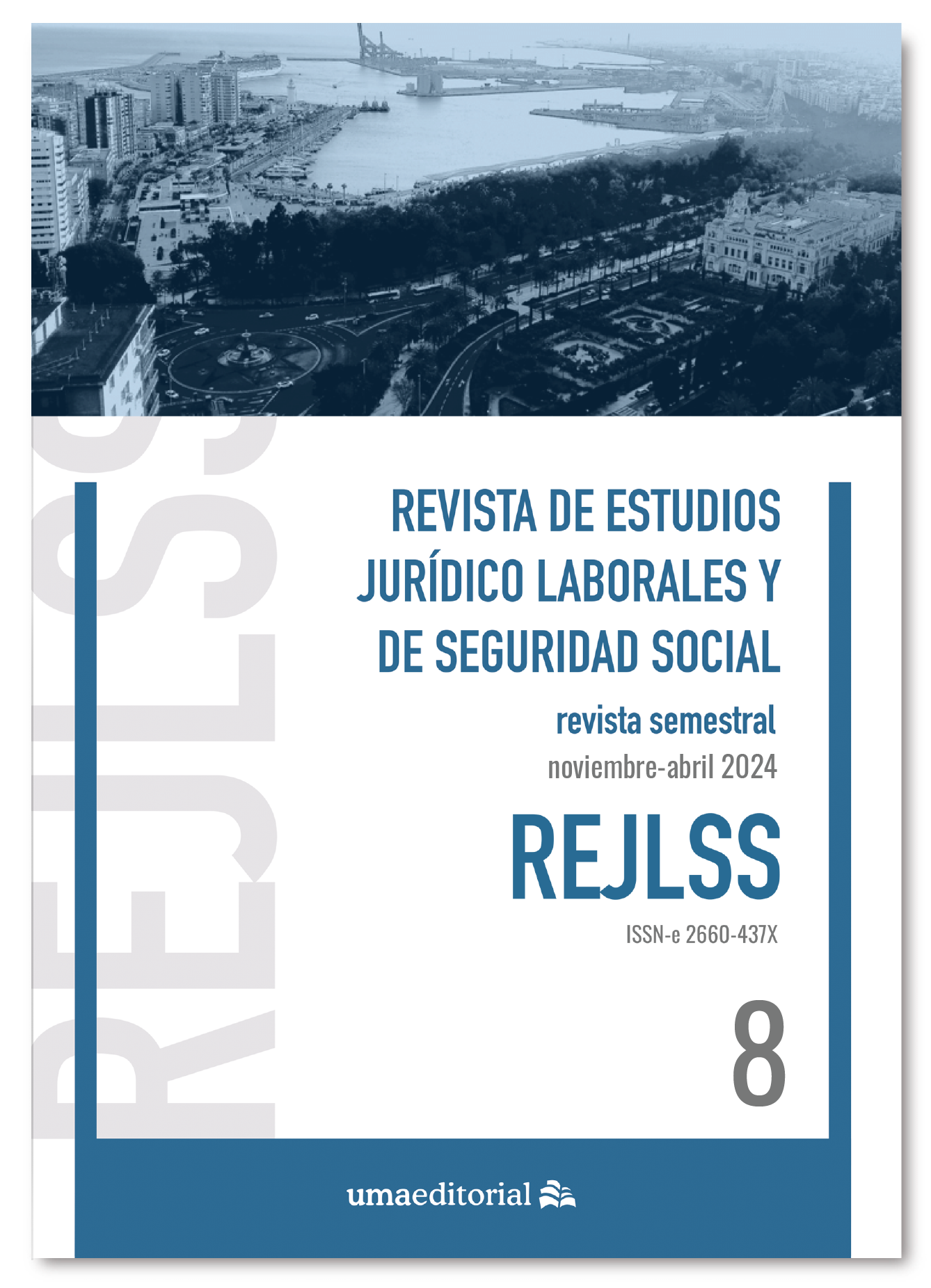ILO. Make visibility of men-women biological inequality key to real and effective work health
DOI:
https://doi.org/10.24310/rejlss8202418406Keywords:
health, work, prevention, gender, training, regulationsAbstract
This research work aims to emphasize health and safety at work from a gender perspective. In this context, the aim is for occupational health to be real and effective. To achieve this, it is essential that the biological difference between men and women be made visible. It is requested to highlight it in the applicable regulations. Also considering that the International Labor Organization in its 110th Conference proclaimed as a fundamental principle: a safe and healthy work environment.
Downloads
Metrics
Publication Facts
Reviewer profiles N/A
Author statements
Indexed in
-
—
- Academic society
- N/A
- Publisher
- Universidad de Málaga. UMA Editorial
References
Bonet Pérez, J., Mundialización y régimen jurídico internacional del trabajo. La OIT como referente político jurídico universal, Atelier, Barcelona, 2007.
Camas Roda, F., Trabajo decente e inmigrantes en España: Un estudio sobre los derechos laborales de los trabajadores migrantes y del objetivo internacional del trabajo decente, Huygens, Barcelona, 2016.
Gil y Gil, J.L., “La declaración del centenario de la OIT para el futuro del trabajo”, Revista General del derecho del trabajo y de la Seguridad Social, núm. 57, 2020.
López Insua, B.M., “Los convenios colectivos sectoriales”, en A.A.V.V. (Monereo Pérez, J.L., Arias Domínguez, A., Gorelli Hernández J. y Vila Tierno, F., Dirs.), Protección social de los trabajadores del campo en el Estado Social Autonómico: aspectos laborales y de Seguridad Social, Laborum, 2019.
Martínez Moreno, C., Álvarez Cuesta, H., Grau Pineda, C. y Castro Franco, A., “Revisión jurisprudencial de las dolencias y patologías que sufren las camareras de piso. Propuestas para su reconocimiento como enfermedad profesional”, Instituto de las Mujeres. Catálogo de publicaciones de la
Administración General del Estado. Madrid, 2023.
Monereo Pérez, J.L., “Derecho a la seguridad y salud en el trabajo”, en A.A.V.V. (Monereo Atienza, C. y Monereo Pérez J.L., Dirs.), El sistema universal de los derechos humanos, Comares, Granada., 2014.
Ramos Quintana, M.I., “El futuro de las mujeres- el futuro de la humanidad: más derechos efectivos para un empoderamiento real”, Trabajo Decente para todos, OIT Oficina para España, 2017.
Rojo Torrecilla, E., “Notas sobre el acoso sexual en el ámbito laboral. Referencias normativas y resoluciones judiciales”, Blog: El nuevo y cambiante mundo del trabajo, una mirada abierta y crítica a las nuevas realidades laborales 23 de noviembre de 2022.
Sanguinetti Rayomond, W., “El Convenio 190 de la OIT sobre la violencia y el acoso y los desafíos de su aplicación por los Estados”, Editorial CISS: Trabajo y Derecho, núm. 95, noviembre de 2022.
Valdeolivas García, Y. y Tudela Cambronero, G., “La protección de la seguridad y salud y salud laboral en la historia de la OIT”, Revista del Ministerio de Trabajo y Economía Social: Revista del Ministerio de Trabajo y Economía Social, núm. 147, 2020.
Downloads
Published
How to Cite
Issue
Section
License
Copyright (c) 2024 Monica Ricou Casal

This work is licensed under a Creative Commons Attribution-NonCommercial-NoDerivatives 4.0 International License.
In the Revista de Estudios Juridico Laborales y de Seguridad Social (REJLSS) we are clearly committed to a policy of open access to scientific knowledge (See Berlin Declaration).
Those authors who have publications with this journal accept the following terms:
This journal provides immediate free access to its content under the principle of making research freely available to the public. All the contents published in the REJLSS are subject to the Creative Commons license
Attribution-NonCommercial-NoDerivatives 4.0 International (CC BY-NC-ND 4.0)
Copyrights are of two kinds: moral and patrimonial. Moral rights are perpetual, inalienable, non-transferable, inalienable, unattachable and imprescriptible prerogatives. In accordance with Spanish copyright legislation, the authors who publish in REJLSS retain the moral right over their work, as well as the ownership of the patrimonial right, which will be transferred to the University of Malaga for its dissemination in open access.
The patrimonial rights, refer to the benefits that are obtained by the use or disclosure of the works. REJLSS is published in open access and is exclusively authorized to perform or authorize by any means the use, distribution, dissemination, reproduction, adaptation, translation or transformation of the work.
It is the responsibility of the authors to obtain the necessary permissions of the images that are subject to copyright.
Authors whose contributions are accepted for publication in this journal retain the non-exclusive right to use their contributions for academic, research and educational purposes, including self-archiving or depositing in open access repositories of any kind.
The electronic edition of this magazine is edited by the Editorial of the University of Malaga (UmaEditorial), being necessary to cite the origin in any partial or total reproduction.
The authors may adopt other non-exclusive license agreements for the distribution of the version of the published work (eg: deposit it in an institutional telematic archive or publish it in a monographic volume) provided that the initial publication is indicated in this magazine.
Authors are allowed and recommended to disseminate their work through the Internet (eg, in institutional telematic archives or on their website) before and during the submission process, which can produce interesting exchanges and increase citations of the published work.







19.png)
